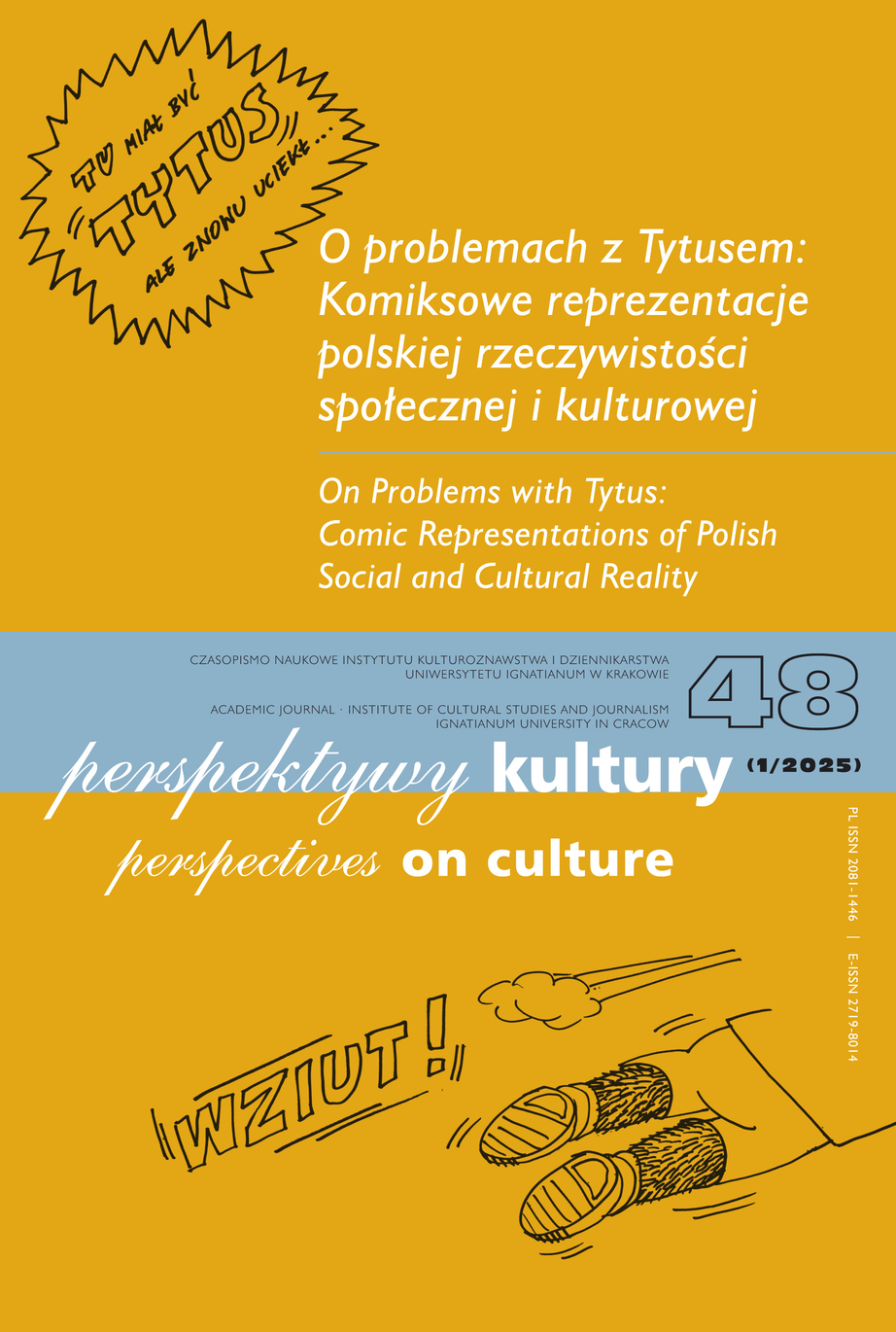Poles and Germans in the Shadow of Geopolitics
The Issue of Polish-German Social Relations and the German Minority in the Journalism of the Bunt Młodych and Polityka Milieus (1931–1939)
Abstract
The article presents the evolution of the views of the milieu centered around the magazine Bunt Młodych (from 1937 published as Polityka) concerning Polish-German social relations. On minority issues, the authors of both titles focused mainly on relations with the Jewish and Ukrainian populations. Germans, as a minority but also as citizens of the Free City of Danzig, were a side topic, but importantly related to the authors’ views on proper Polish-German relations on interstate grounds. The present text develops and complements the theses presented in the book Conservative Revolution – the Case of Poland. The political thought of the milieu of Bunt Młodych and Polityka (1931–1939) which had previously only outlined these ideas. A particularly important element is the demonstration of the link between the evolution of views on national relations and the change of the international situation. The growing importance of the so-called “German problem” became evident with the worsening of relations with the German Reich. The most striking indication of this shift was the publication in 1939 of Józef Winiewicz’s work Mobilization of German Forces in Poland, which served as a prelude to his later theoretical work at the Ministry of Congress Works of the Polish Government in London during the Second World War. This article presents one aspect of the geopolitical conditioning of the magazine’s program line towards minorities, which highlights the value of political realism in the pre-war activities of Jerzy Giedroyc and his associates.
References
Andrószowski, W. (1928a). Zagadnienie Polski mocarstwowej. Myśl Mo-carstwowa, nr 1, 3.
Andrószowski, W. (1928b). Polska polityka mocarstwowa. Myśl Mocar-stwowa, nr 2, 4–6.
Bocheński, A.M. (1927). Imperializm nacjonalistyczny a imperializm pań-stwowy. Myśl Mocarstwowa, nr 1, 4–7.
Bocheński, A.M. (1939a). Co to jest „polityka 1934 r.”? Polityka, nr 7, 1.
Bocheński., A.M. [Fr. Czerwiski] (1939b). Z kim prowadzimy walkę. Poli-tyka, nr 27, 1–2.
Habielski, R. (2006). Dokąd nam iść wypada? Jerzy Giedroyc od „Buntu Młodych” do „Kultury”. Warszawa: Więź.
Klafkowski, A. (1938). Niemcy w Wielkopolsce. Polityka, nr 14, 6.
Koper, J. (1931). Amputowane miasto. Bunt Młodych, nr 28, 6.
Król, M. (1978). Style politycznego myślenia. Wokół „Buntu Młodych” i „Polityki”. Paryż: Libella.
Listowski. A. (1937). Zu vier Jahreszeiten. Bunt Młodych, nr 1, 6–7.
Malinowski, J. (1931). Obchód Grunwaldzki. Dzień Akademicki, nr 16, 2.
Myśl Mocarstwowa (1930). Odezwa warszawskiego koła Myśli Mocar-stwowej. Pozyskano z: https://polona.pl/item-view/e1e89848-8b74-42a4-8132-ba8e778abccd?page=0 (dostęp: 12.10.2023).
Piłsudski, R. (1929). Legia Mocarstwowa. Słowo, nr 173, 1.
Piłsudski, R. (1931a). Co każdy akademik o „Myśli Mocarstwowej” Z.A. wiedzieć powinien. Civitas Academica, nr 16, 1.
Piłsudski, R. (1931b). Frontem do dwóch mórz. Bunt Młodych, nr 25, 1.
Pruszyński, K. (1933). Inaczej niż 90 proc. prasy polskiej. Bunt Młodych, nr 39, 1–2.
Pruszyński, K. (2004). Sarajewo 1914, Szanghaj 1932, Gdańsk 193?. War-szawa: Czytelnik.
Pruszyński, M. [M.P.] (1939). Jak wygląda rzeczywistość w Gdańsku w czerwcu 1939 r. Polityka, nr 18, 1–2, 6.
Raubach, L. (1931). Kto jest Mocarstwowcem? Bunt Młodych, nr 22, 2.
Redakcja (1938). Notka do tekstu Niemcy Wielkopolsce. Polityka, nr 14, 2.
Starża, A. (1931). O program słowiański Młodzieży Mocarstwowej. Bunt Młodych, nr 21.
Tomczyk, R. (2008). Myśl Mocarstwowa. Z dziejów młodego pokolenia II Rzeczpospolitej. Szczecin: Print Group.
Wierciński, M. (1931). Gdańsk i Gdynia. Bunt Młodych, nr 21, 5.
Winiewicz J. (1939). Mobilizacja sił niemieckich w Polsce. Warszawa: Pol-ityka.
Winiewicz, J. (1943). The Quest for German Blood. London: Stratton House.
Winiewicz, J. (1944b). The Polish-German frontier. London: William Hodge and Company.
Zakrzewski, M. (2021). Rewolucja konserwatywna – przypadek polski. Myśli polityczna „Buntu Młodych” i „Polityki” (1931–1939). Kraków: Ośrodek Myśli Politycznej, Instytut Pamięci Narodowej.
Zaremba, M. (1931). O mocarstwową politykę zagraniczną. Dzień Aka-demicki, nr 10, 1.
Zespół „Polityki” (1938). Polska idea imperialna. Warszawa; Polityka.
Żejmis, S. (1935). Migawki wschodnio-pruskie. Bunt Młodych, nr 14–15, 6.
Copyright (c) 2025 Perspectives on Culture

This work is licensed under a Creative Commons Attribution-NoDerivatives 4.0 International License.
Autor, zgłaszając swój artykuł, wyraża zgodę na korzystanie przez Wydawnictwo Uniwersystet Ignatianum z utworu na następujących polach eksploatacji:
- utrwalania utworu w formie papierowej, a także na nośniku cyfrowym lub magnetycznym;
- zwielokrotnienia utworu dowolną techniką, bez ograniczenia ilości wydań i liczby egzemplarzy;
- rozpowszechniania utworu i jego zwielokrotnionych egzemplarzy na jakimkolwiek nośniku, w tym wprowadzenia do obrotu, sprzedaży, użyczenia, najmu;
- wprowadzenia utworu do pamięci komputera;
- rozpowszechniania utworu w sieciach informatycznych, w tym w sieci Internet;
- publicznego wykonania, wystawienia, wyświetlenia, odtworzenia oraz nadawania i reemitowania, a także publicznego udostępniania utworu w taki sposób, aby każdy mógł mieć do niego dostęp w miejscu i czasie przez siebie wybranym.
Wydawca zobowiązuje się szanować osobiste prawa autorskie do utworu.





